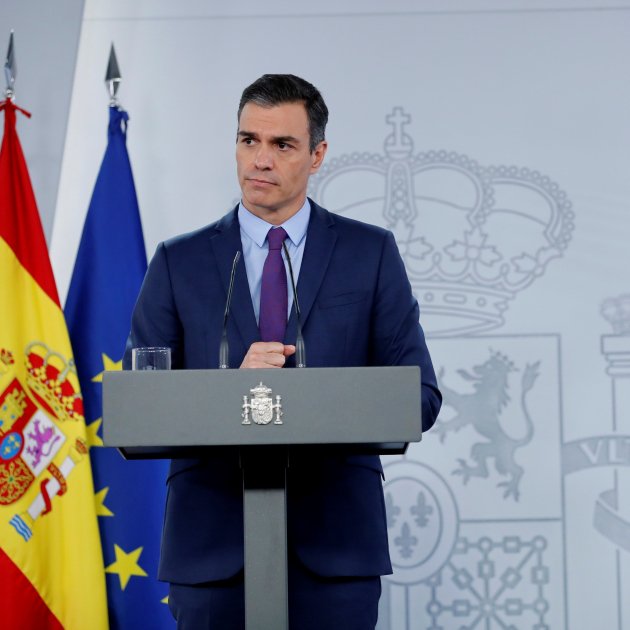Twenty hours had to go by after Monday's bombshell announcement on the exile of Juan Carlos I before the Spanish government made an official statement on the matter - and even then, it was largely memorable for what it didn't say. This Tuesday afternoon, prime minister Pedro Sánchez, took advantage of a planned press conference to defend the Spanish monarchy and the constitutional regime of 1978, while refusing to talk about the role of his executive in the flight to exile of the corruption-mired king emeritus, announced yesterday in a statement by the royal house. The Spanish PM argued that it is a confidential matter and even refused to reveal the country which the former king is now in, claiming he simply didn't know. “I have no information on where he is,” he affirmed.
Sanchez tried as far as possible to maintain silence on the royal exile, to the point that he only addressed the institutional crisis in questions from journalists in the final stages of his press conference. His remarks on the matter in his speech itself stressed that the country's political system was working rather than being in an unprecedented crisis. The elements of a "vigorous democracy" - media, prosecutors, courts - are were all playing their parts as they should; the constitutional pact of 1978 - under which the king is Spain's head of state - is "as fully in force as ever". And the Spanish government had an "absolute respect" for the decisions taken by the royal house "to distance itself from certain supposed deplorable conduct by one of its members".
From Sánchez's words, it was clear that he is light years away from the uneasiness expressed by his coalition partner Podemos in the support that the PSOE members of the government have given to Juan Carlos I - "we are two different parties", he noted, making it clear that he, as prime minister, marks the official line. "Institutions are not judged, people are judged." said Sánchez. "The system of political parties has not been questioned when there have been cases of corruption in the parties" - by analogy, implying that the monarchy should not be questioned now. "Juan Carlos has said that if it were necessary, he would be at the disposition of justice like any other Spaniard," affirmed Sánchez in his defence of the institution.
"Now more than ever, Spain needs stability and robust institutions. And the government considers the constitutional pact fully in force," he added, making it clear that it would not question the country's post-Franco agreement of 1978. He even recalled that the PSOE is the only surviving party in that pact.
Sánchez hinted that he had spoken with Felipe VI over the situation of Juan Carlos, but refused to explain the negotiations on the grounds that talks between the royal palace and the government are "discreet and confidential". Meanwhile, despite the massive discrepancies visible Podemos at present, the PSOE leader said he was convinced that the legislature would be "long and fruitful."
In short, a Pedro Sánchez fully intent on normalizing the crisis in the institution which heads the Spain state, obscuring the fact that the pressure has come from the prosecution underway in Switzerland and, secondly, from the tape recordings made by rogue former police commissioner Villarejo. "It is the response of a vigorous democracy; the media have done their job and made facts known; the judges are acting and the royal house has distanced itself from these alleged illegal actions," he summed up in an effort to portray the glass as half full.
